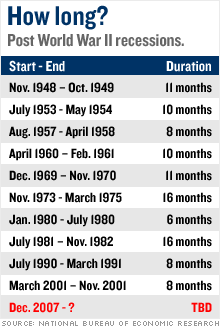Entrepreneurs pessimistic on future
Anticipating weak sales, small business owners are scaling back on hiring and expansion plans for 2009.

NEW YORK (CNNMoney.com) -- Small business owners hit hard by the recession have little confidence that things will get better in the coming months, according to two surveys released on Tuesday.
For December, the National Federation of Independent Business (NFIB) saw some of its lowest readings in the 35-year history of its monthly report, dubbed the Small Business Optimism Index. More than half of the business owners polled, 53%, said their profits fell in the past three months compared to the prior quarter, and 46% reported lower sales. Only 15% of respondents said their sales have increased recently, a record-low number.
The National Small Business Association (NSBA) saw similar results in its just-released survey of how business owners have fared over the past year. While 38% said their sales had increased, 45% reported declining sales.
As a result, business owners will be taking a cautious approach to running their firms in 2009. Among the NFIB's constituency, 13% more owners expect economic conditions to worsen than foresee improvements. The NSBA reported that 64% of its survey respondents expect the recession to continue for the next 12 months, compared to just 3% who anticipate an economic expansion.
When asked specifically about their own business outlook, 38% of NSBA respondents said they are not confident about the financial future of their enterprise - a sharp increase from the 25% of owners who gave that response in August.
"Owners tend to think more negatively about overall economic conditions than their own business conditions," said Molly Brogan, vice president of public affairs for the NSBA. "But more than a third are worried about the future of their own business. We were really surprised by that jump from August. That's a lot of small businesses who are concerned about whether they will be open in 12 months."
Business owners are taking steps to compensate for the poor spending environment. For example, the NFIB's survey found that 29% of owners liquidated inventories in December, compared to a mere 7% who stocked their shelves.
Businesses are also cutting staff to reduce their overhead. The NFIB's December survey found the largest monthly decline in small-business employment in the survey's history, and 7% of owners said they had reduced compensation for their staff. In the NSBA's survey, 26% said they had to shed staff in the last 12 months, compared to 18% who added positions.
Similar measures will follow in the new year. Expansions are on hold, with planned investments in new staffing and capital expenditures falling to levels not seen since the 1974-75 recession, according to the NFIB.
"In this uncertain environment, owners are postponing any capital projects that are not essential to the operation of the firm - or that they can't afford or can't finance," William Dunkelberg, chief economist for the NFIB, said in a written statement.
Weak sales and overall economic uncertainty are the top concerns for business owners right now. While only 6% of those in the NFIB's report said they had problems obtaining loans and other financing, 33% made the same claim in the NSBA survey. Furthermore, while 56% of those surveyed by the NSBA in August said they paid off the balance on their credit cards each month, only 50% could say the same in December.
"We talk with those that rely on credit cards, and 69% say it's gotten worse. That's huge," said NSBA's Brogan. "There have been terms and APR changes, even when the owner didn't do anything wrong. We think it's very actionable, and we hope to see the new administration jump on credit-card reform." ![]()
-
The Cheesecake Factory created smaller portions to survive the downturn. Play
-
A breeder of award-winning marijuana seeds is following the money and heading to the U.S. More
-
Most small businesses die within five years, but Amish businesses have a survival rate north of 90%. More
-
The 10 most popular franchise brands over the past decade -- and their failure rates. More
-
These firms are the last left in America making iconic products now in their twilight. More












